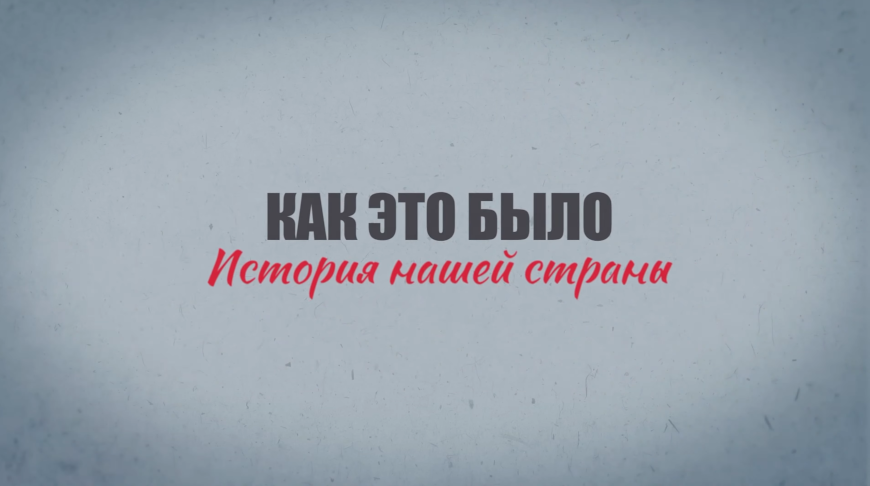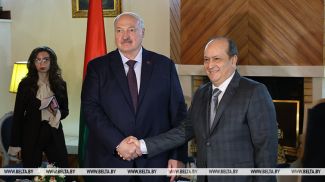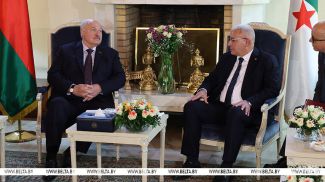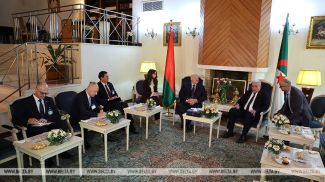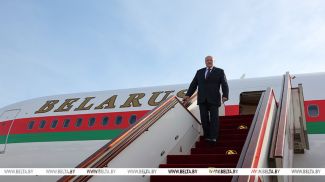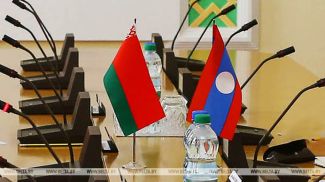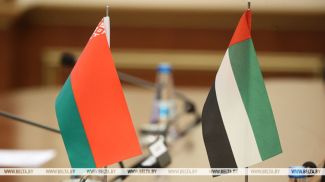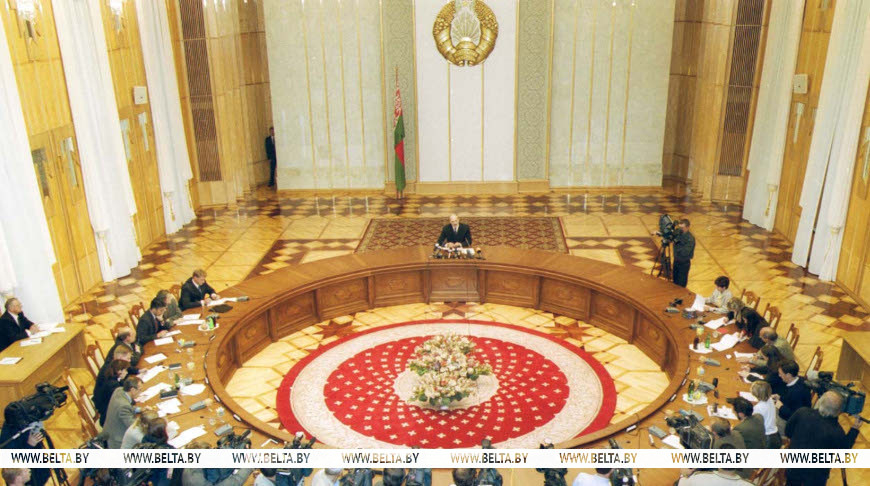
Aleksandr Lukashenko during an interview with Belarusian and foreign mass media after the election, September 2001
In 2001 the fiercest political fighting began in Belarus ahead of a presidential election. After securing a confident victory in the polls, Aleksandr Lukashenko called upon his supporters and opponents not to start conflicts and not split the society with hostile confrontation, not to cast away stones but gather them in order to build a temple – our Belarus. In the new episode of BelTA’s YouTube project “How it was: DOC” we will revisit the year 2001 in order to learn what challenges the Belarusian statehood encountered at the turn of a new millennium and how the slogan “For a strong and prosperous Belarus!” emerged to later become essentially a national idea of Belarusians. Why Aleksandr Lukashenko invited artistic intelligentsia for a brainstorming session and who became the first Hero of Belarus. How the friendship with Qatar and China was born and with what statement the head of state addressed the international community on the occasion of tragic events in the United States of America.
Why did Aleksandr Lukashenko build a strong power vertical?
The second Belarusian People’s Congress took place in May 2001. In time this large-scale forum would receive constitutional status as the highest representative body of the people’s power in Belarus. But let’s not get ahead of ourselves.
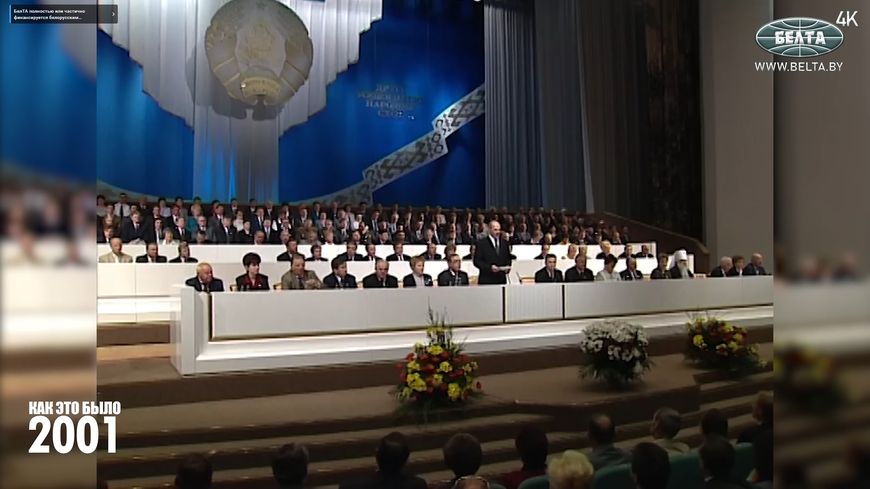
The participants of the meeting - 2,500 delegates from all corners of the country - had to discuss local and regional problems and determine the paths for the country’s development in the near future at the national level. Of course, over the past years Belarusians experienced both achievements and failures. But the main result with which the country entered the new millennium was that for the first time in its centuries-old history, Belarus emerged as an independent and self-sufficient state.
Following the collapse of the Soviet Union, the Belarusian society was on the brink of chaos. “Through thorns to the stars” may be an apt description of the life of the state in this period. The authorities managed to create effective state institutions and an optimal social and economic system. Despite fierce criticism from both the right and the left, Belarus chose the path of evolutionary - not revolutionary! - transformations and it proved effective.
But the question arose: where to go and, most importantly, how to move forward? Export, housing, and food remained priority areas for the next five-year term. Aleksandr Lukashenko described workers and intellectual capabilities of the population as the main tool for implementing them. The improvement of the people’s welfare and, accordingly, their standard of living is the strategic goal of the country’s social and economic development for the next five-year term, the president declared. This is why the report presented by the head of state at the Belarusian People’s Congress was built around the idea “For a strong and prosperous Belarus” for a reason. It became the motto of Belarusians for long 15 years. In 2016 this slogan underwent minor changes when the necessary focus was added: “Together for a strong and prosperous Belarus!”.
“Where are the ‘all-wise’ skeptics and ‘profound’ analysts who predicted our inevitable collapse and bankruptcy? What can those say who openly mocked our plans to revive a nearly lifeless economy, implement targeted social policies, and strive to maintain guarantees for people, as well as prospects for youth and children? We have developed an effective functioning system of state governance - a ‘vertical of power’. We acted on the basis of the people’s demands. If you recall, seven years ago during the presidential election, everyone claimed that the power was in the mud. Even the laziest ones would trample that power. We’ve managed to lift it from the mud and make it a real power in the country. Exactly the kind that can preserve our country,” Aleksandr Lukashenko stated.
What threats did the president face in the early 2000s?
While the authorities and the people were focused on dealing with vital problems and on working out strategic guidelines of development for the next few years, the fiercest political fighting began in the country. Calling it an information war was already acceptable back then. Well, how was it triggered? They launched it.
The opposition had one goal: to seize power by any means. The West invested a lot of assets in the development of the recipe for their victory. It is true that for some reason no one accounted for the fact that the opposition lacked one but very important ingredient: support of the people. The opposition’s failure to collect signatures surprised even the president. When the opposition saw the real state of affairs and its genuine reflection in the mirror the Belarusian nation was, the opposition had no way out but to roll the dice by starting a wild information war on the current government and by committing violations bordering on crimes.
“You know, no one has ever called me a murderer in my life. But today, stones are being thrown at the people standing next to me, with the intention of hitting me. I understand this perfectly. No one is really targeting Sheiman, Pavlyuchenko, Sivakov, Myasnikovich, or Yermoshin. What they want is to eliminate Lukashenko. And the attack will be directed at the vertical structure of power. Why? Because they know very well that the current presidential election is organized by the vertical power structure. That’s no secret to anyone. So that’s where the first blow is aimed,” Aleksandr Lukashenko emphasized in the summer of 2001 during a meeting to discuss the tasks of executive and administrative authorities.
The president spoke firmly: neither this nor any other attack from the opposition will succeed. “I will not only defend myself – I will defend my people and my state until the last moment of my life. They won’t do anything to me; they are dealing with the wrong person. I won’t hide around the corner. That’s honest and straightforward,” the Belarusian leader said candidly.
“I will win this presidential election, whether it's with your support, which I’d prefer, or without it. And I’m not afraid of anyone. I will tell people even more than I’ve said today. I believe that if people have access to all the information, they will simply understand what the West and the OSCE are really doing. Let them read the documents. Some of those who are undecided will understand what’s really happening in our society today. The authorities are going to hold an examination. We must restore order on the streets, pay people their wages, apologize to them if anything wasn’t done, and explain why. There is no need for lies: we must approach people openly and tell the truth. And you’ll see: 90% of them will support us. Because we’ve avoided military conflicts. We are the only place in the post-Soviet space without religious strife. It was difficult, but we tried for the sake of the people. The authorities did not enrich themselves at the expense of the people. We have nothing to justify. We just need to tell people the truth sincerely and honestly,” the head of state required.
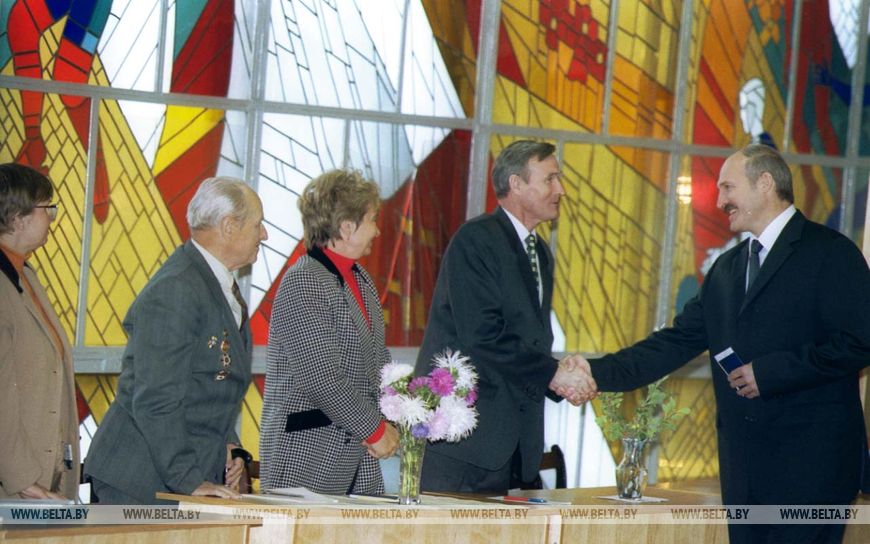
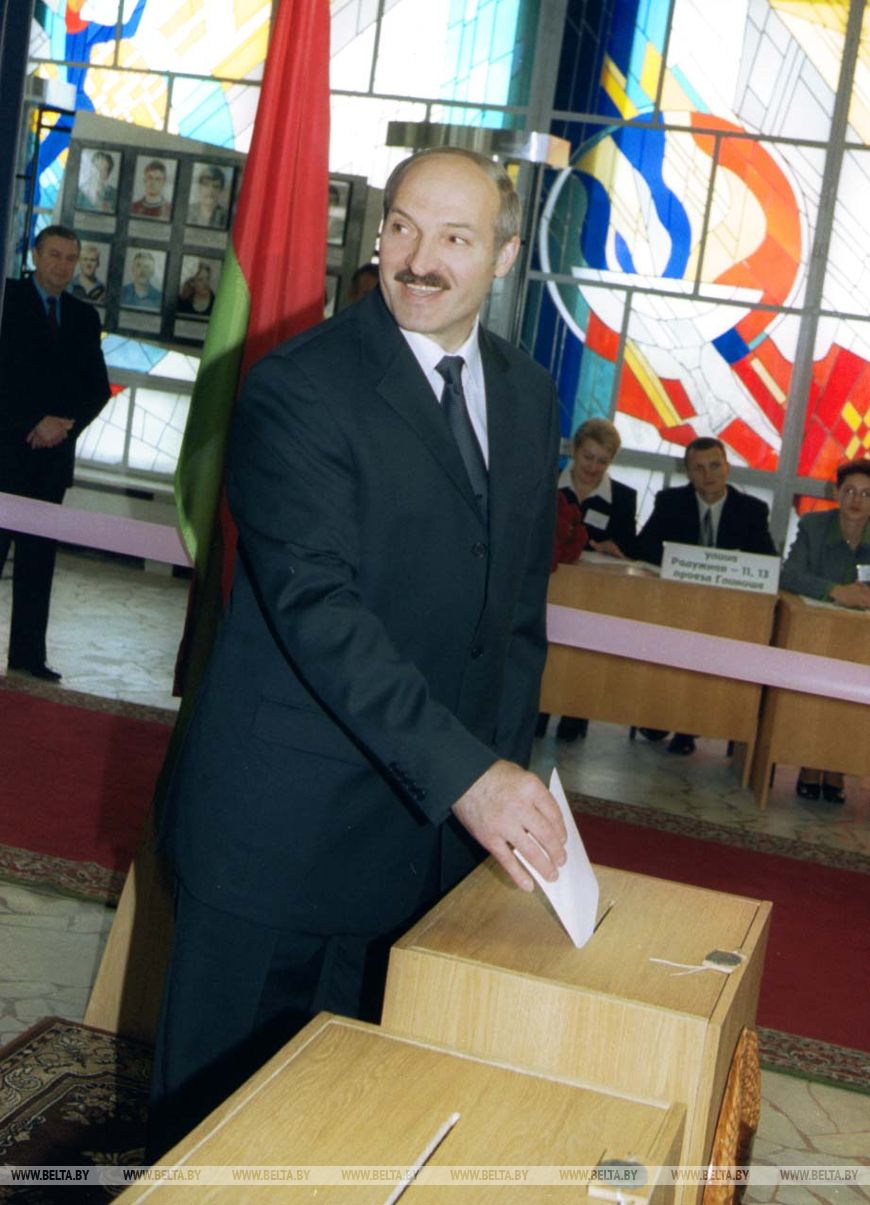
The presidential election took place on 9 September 2001. Later that evening, Aleksandr Lukashenko commented on the preliminary results. The president admitted he had expected to win the election. Where did this confidence come from? The answer is clear. During his years in office, there were no systemic mistakes. Instead, Belarusians moved forward, building on the achievements of previous generations. In other words, the government listened to the people and took the decisive steps that they had been waiting for. That was the recipe for the Belarusian leader's victory.
The president spoke firmly: neither this nor any other attack from the opposition will succeed. “I will not only defend myself – I will defend my people and my state until the last moment of my life. They won’t do anything to me; they are dealing with the wrong person. I won’t hide around the corner. That’s honest and straightforward,” the Belarusian leader said candidly.
“I will win this presidential election, whether it's with your support, which I’d prefer, or without it. And I’m not afraid of anyone. I will tell people even more than I’ve said today. I believe that if people have access to all the information, they will simply understand what the West and the OSCE are really doing. Let them read the documents. Some of those who are undecided will understand what’s really happening in our society today. The authorities are going to hold an examination. We must restore order on the streets, pay people their wages, apologize to them if anything wasn’t done, and explain why. There is no need for lies: we must approach people openly and tell the truth. And you’ll see: 90% of them will support us. Because we’ve avoided military conflicts. We are the only place in the post-Soviet space without religious strife. It was difficult, but we tried for the sake of the people. The authorities did not enrich themselves at the expense of the people. We have nothing to justify. We just need to tell people the truth sincerely and honestly,” the head of state required.


The presidential election took place on 9 September 2001. Later that evening, Aleksandr Lukashenko commented on the preliminary results. The president admitted he had expected to win the election. Where did this confidence come from? The answer is clear. During his years in office, there were no systemic mistakes. Instead, Belarusians moved forward, building on the achievements of previous generations. In other words, the government listened to the people and took the decisive steps that they had been waiting for. That was the recipe for the Belarusian leader's victory.
What did Lukashenko call on his supporters and opponents to do?
Soon after, Aleksandr Lukashenko once again officially assumed the office of President of Belarus and, in the presence of the country’s top officials and numerous guests, took the oath of allegiance to the Belarusian people. In his speech, the president also reminded everyone of the idea consolidating the Belarusian society: to build a strong and prosperous country, to live in peace and harmony, and to cooperate with all states and peoples. Belarus is an open, democratic European state with its own history, rich culture, and a hardworking, friendly people. We don’t need what belongs to others; we create our own prosperity through our hard work, energy, and intelligence. These words remain true to this day.
“Dear compatriots, esteemed foreign guests. Our great writer, passionate patriot, and my fellow countryman Vladimir Korotkevich once wrote: ‘Let love for your native Belarus fill your hearts, people. Magnificent and proud, it deserves it.’ These heartfelt words mean a lot to me. They reflect the essence of my work during my first term as president and the reason why I will continue working in the next five years. We all must be united by love for our Motherland and genuine concern for the well-being of our people, their present and future. I appeal to representatives of various political parties and public associations, to all voters, including those who did not vote for me. The election is over, and the people have expressed their will. Now the most important thing is not to fuel conflict or divide society through hostile confrontation. It is time to stop casting away stones and instead gather them together to build a temple: our common Fatherland, our Belarus.”
Who became the first Hero of Belarus?
The year 2001 was marked by another solemn event. The first Hero of Belarus awards were presented ahead of Independence Day. The honorary titles went to Director General of the industrial group BelAZ Pavel Mariyev, the head of the Nesvizh District agricultural enterprise Agrokombinat Snov Mikhail Karchmit, and the head of the Grodno District agricultural enterprise Oktyabr Vitaly Kremko. A Hero of Belarus title was awarded posthumously to the former chairman of the Grodno Oblast Executive Committee Aleksandr Dubko.
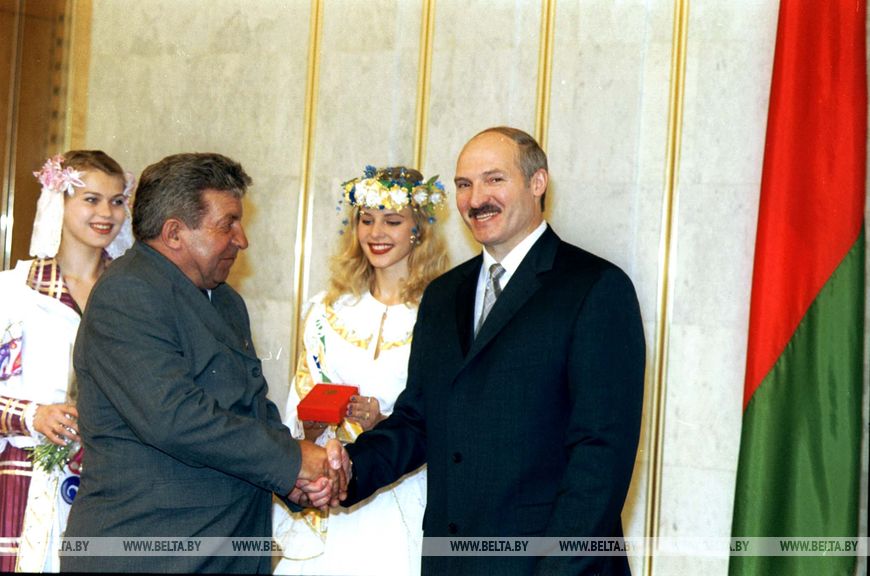
Aleksandr Lukashenko congratulated Vitaly Kremko on receiving the Hero of Belarus award.
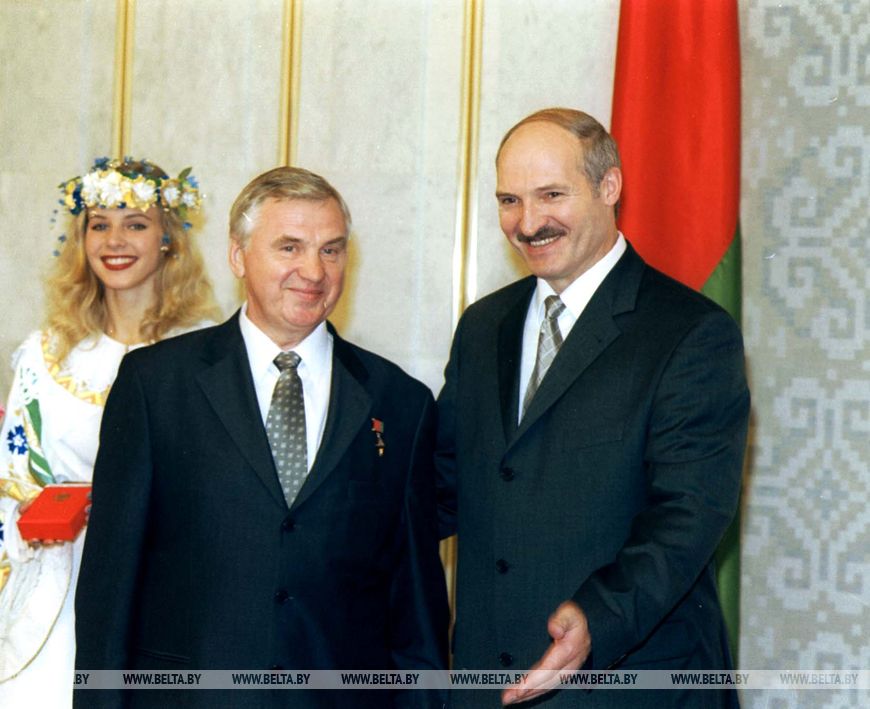
Aleksandr Lukashenko congratulated Pavel Mariyev on receiving the Hero of Belarus award.
As of today the award has been bestowed upon 14 people, including two women: a four-time Olympic champion Darya Domracheva and the Belarusian cosmonaut Marina Vasilevskaya.
How the cultural sector was saved in Belarus
What kind of brainstorming session did Aleksandr Lukashenko gather the creative intelligentsia for? In February 2001, the head of state convened a large-scale meeting to discuss measures to address development problems of culture and art, signaling that a substantive, and likely difficult, discussion was ahead.
Aleksandr Lukashenko frequently organized such brainstorming sessions with key sectors, including education, healthcare, agriculture, and industry, which typically resulted in significant policy decisions.
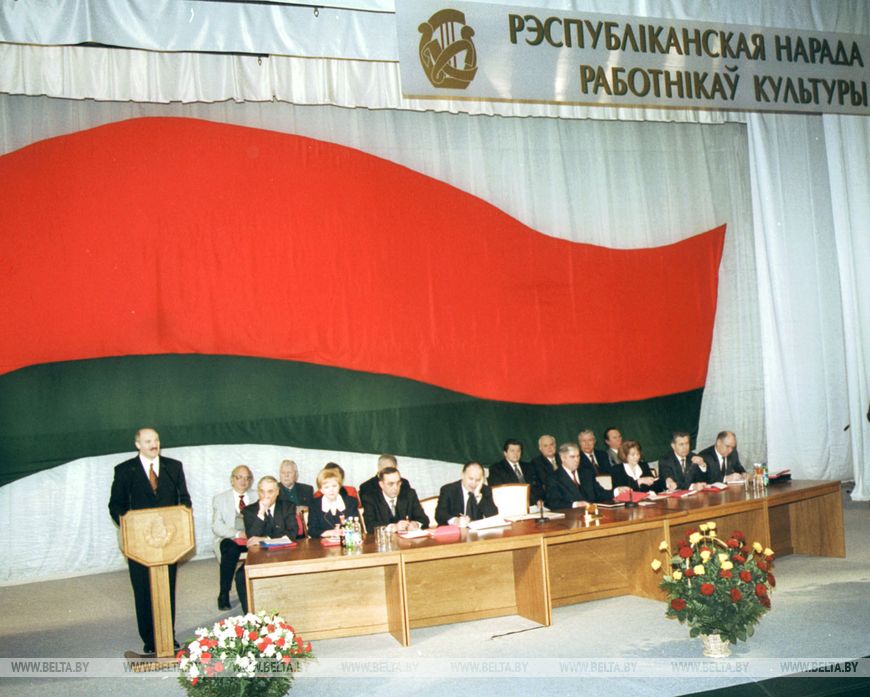
The president convened such a large-scale meeting to address the prolonged lack of dialogue with the creative community, an omission he sought to correct. He called national culture a cornerstone strategic resource of the state and tasked the attendees with drafting a specific program to enhance its development.
“I am observing very closely what is happening within the creative intelligentsia. I am well familiar with the main problems and directions of work. But my creed as head of state is not to interfere in minor matters, not to pressure creative people, and not to impose any opinions on them. In short, not to get in the way of their work. However, this has nothing in common with indifference or inattention. The task of the authorities is to have a deep and objective knowledge of the trends and to create optimal conditions for the development of all, I emphasize, all types of art and culture, taking into account the real possibilities available to the state and society. It is precisely a nationwide, not a narrow departmental approach that allows for a large-scale assessment of phenomena, seeing the acuteness of problems, and determining the most important areas of activity. Today we can say with confidence - we have raised culture from collapse, pulled it out of political squabbles, and placed it at the center of state social policy,” said the Belarusian leader.
Aleksandr Lukashenko was not exaggerating. Upon assuming the presidency in 1994, the national culture, just like the economy, was in a dire state. Theaters and museums were facing imminent closure, and artistic collectives were languishing. Amateur ensembles, folk theaters, and orchestras disbanded in rapid succession. Official orders were being drafted to shutter children’s music and art schools, particularly in rural areas. The manufacture of musical instruments and cultural center equipment had sharply declined. But the most profound damage, echoing a Bulgakov character, was the ‘devastation in people’s heads’, a crisis of spirit that was far more than a metaphor.
In the early 1990s, aggressive nationalists began seizing substantive power. They weaponized the cultural sphere, transforming it into an arena for political combat and systematically eroding the nation’s historical memory. This revisionism included the rapid rewriting of textbooks, which promulgated falsehoods alleging the Soviet people, not the Nazis, were responsible for starting World War II. Partisans were recast as ‘bandits’, while police collaborators and Belarusian SS units were perversely glorified as ‘fighters for European culture and freedom in cooperation with Great Germany’.
Fortunately, the new government was able to cope with these challenges, consolidate society and protect the true interests of its people. But what problems did Belarusian culture face in the new millennium?
“The essence of this moment is that we are creating our own statehood, a statehood at a higher level. We are creating an entirely new state. Unfortunately, the experience of others does not always take root fruitfully in Belarusian soil. Understand that it is very difficult to create, to build something great, to support and finance it, while the process of building the state itself and those institutions that are supposed to solve these tasks is still underway. This constitutes the greatest difficulty and the core problem of the last five years for the president, for representatives of government bodies, and for you, creative workers. The complexities and the scale of the problems that exist today require enormous costs, but funds are scarce. We must abandon the illusion that someone will give us these funds free of charge. They will not, until they are convinced that our economy is working and that we are capable of repaying the loans. There can be no other logic,” Aleksandr Lukashenko said, immediately setting the priorities.
What Lukashenko called the foundation of Belarus’ sovereignty
The president affirmed that culture was and would remain a state priority, underscoring its vital role in shaping civil society. He clarified, however, that the essence of a true civil society is often misunderstood. It must not be founded on confrontation, he emphasized, but on the collaborative, constructive work of public organizations, social movements, political parties, and all branches of government. Belarusians do not need upheaval and turmoil; what we require is order and national prosperity.
“Of course, we still have many problems. They are known, and the government and all branches of power are working on their solution. Our goal is to improve the people’s welfare and make the country economically strong. After all, it is the economy that is the foundation of both our sovereignty and our political authority in the world, as well as the spiritual flourishing of the nation. We must build our welfare with our own hands, our own minds, energy, and talent. This is the most reliable path and a guarantee of independence. Neither Soros grants nor handouts from foreign funds will elevate our culture. It is only by our own hands, through joint effort, fostered by friendship and civic unity, and by consolidating our society around the noble ideas of serving the Fatherland, that we will achieve this high goal! I have said more than once: when we are richer, we will allocate more funds to culture. I guarantee you!” the Belarusian leader stated.
Why did Belarus start to advance cooperation with Qatar?
And now let’s go on a short trip. In February 2001, Aleksandr Lukashenko made his first official visit to Qatar. At the ramp, the head of state was greeted by the-then Emir of Qatar, Hamad bin Khalifa Al Thani. The leaders’ negotiations culminated in key intergovernmental agreements, establishing the first legal framework for bilateral relations between the two nations.
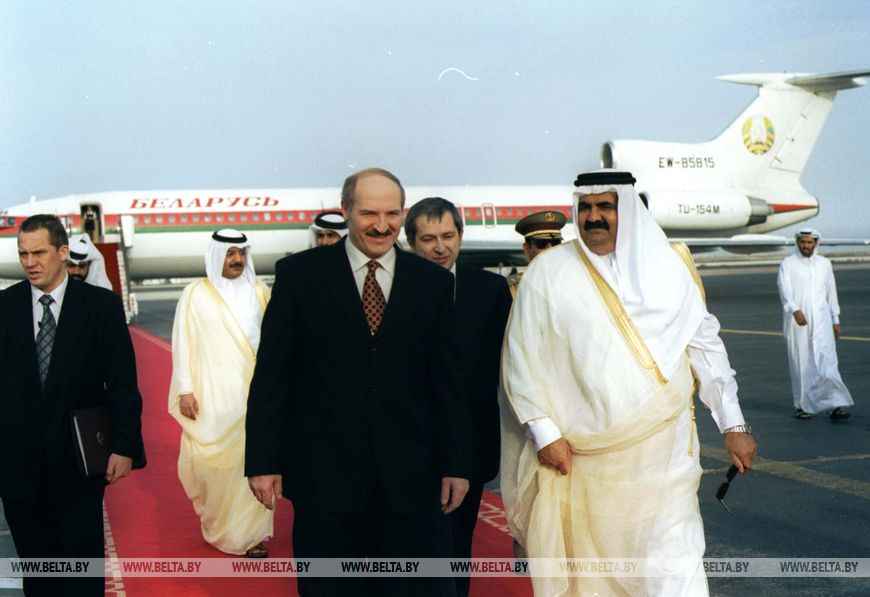
Aleksandr Lukashenko and Hamad bin Khalifa Al Thani at a ceremonial meeting
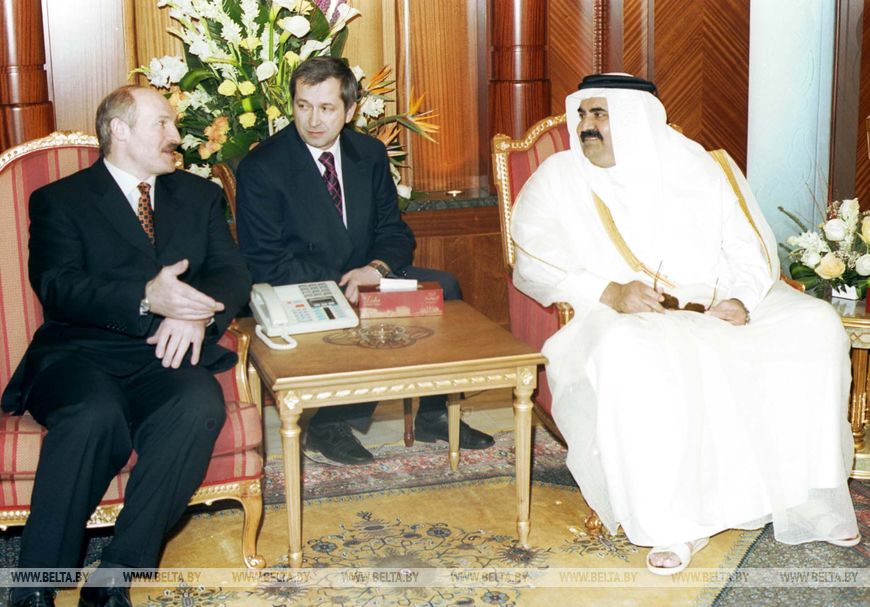
Prior to this, Belarus had no formal political or trade ties with Qatar. Today, the two countries have complete mutual understanding in politics, and Minsk views Doha as a promising partner for future high-tech collaboration.
How did Belarus forge ties with China?
Couple months later, the president of Belarus was welcomed in Beijing on a state visit. After top-level talks, the countries signed a joint declaration that defined the priorities of bilateral relations for the future. Aleksandr Lukashenko and the-then Chinese President Jiang Zemin noted the absence of disagreements on major international issues and advocated a multipolar world and non-interference in the internal affairs of other countries.
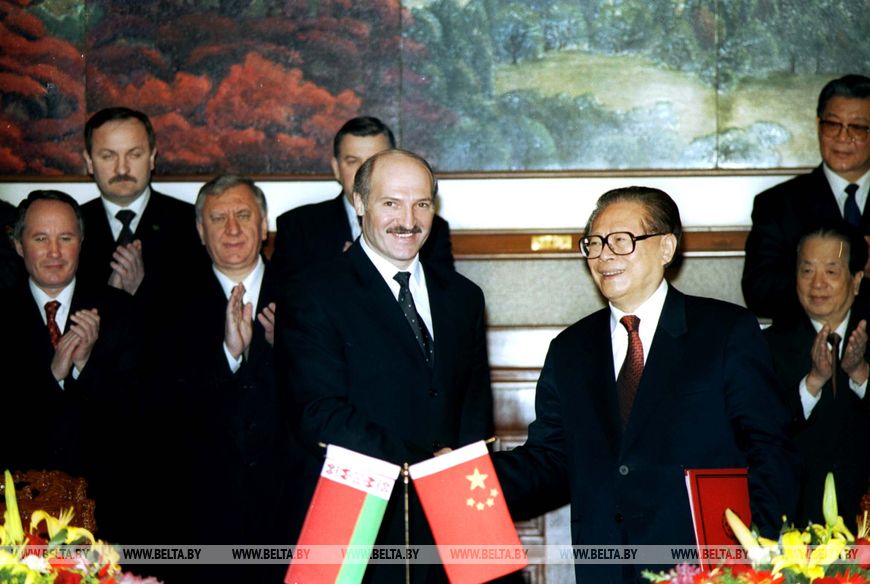
In summer 2001, Chairman of the People’s Republic of China Jiang Zemin made a reciprocal state visit to Belarus. Aleksandr Lukashenko discussed with him the implementation of previously reached agreements, ways to strengthen strategic partnership, and the development of trade and economic relations. Jiang Zemin noted that this was not the first meeting with the president of Belarus and that they had long become friends. These words set the tone for all meetings and negotiations. Back then, Belarus and China dreamed of achieving an annual trade of $500 million. Today it has already exceeded $8 billion. In 30 years, our bilateral trade has multiplied 140 times.
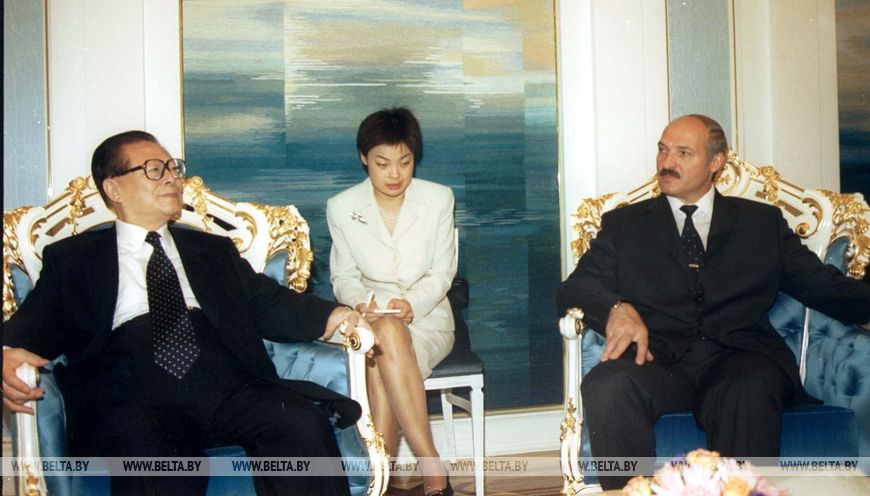
“We highly value our relations with the People’s Republic of China. I am confident that, no matter the times in Belarus, the friendship between the Belarusian and Chinese peoples will last for centuries,” Aleksandr Lukashenko assured. “Belarusian leadership also emphasizes with satisfaction that we have absolutely unified approaches to all global issues, whether it be the fundamental principles of the peaceful coexistence of states, the preservation of the Anti-Ballistic Missile Treaty, the enlargement of NATO, and many, many others. We have long adhered to these unified views and principles from both Belarus and the People's Republic of China.”
What did Lukashenko call the evil of the 21st century?
The dawn of the new millennium served as a stark reminder of our world’s profound fragility. Across the post-Soviet space, nations commemorated the 60th anniversary of the beginning of the Great Patriotic War of 1941-1945. In the West, 2001 became synonymous with terrorism, violence and wars. We still remember the tragic attacks on the United States that claimed thousands of innocent lives.
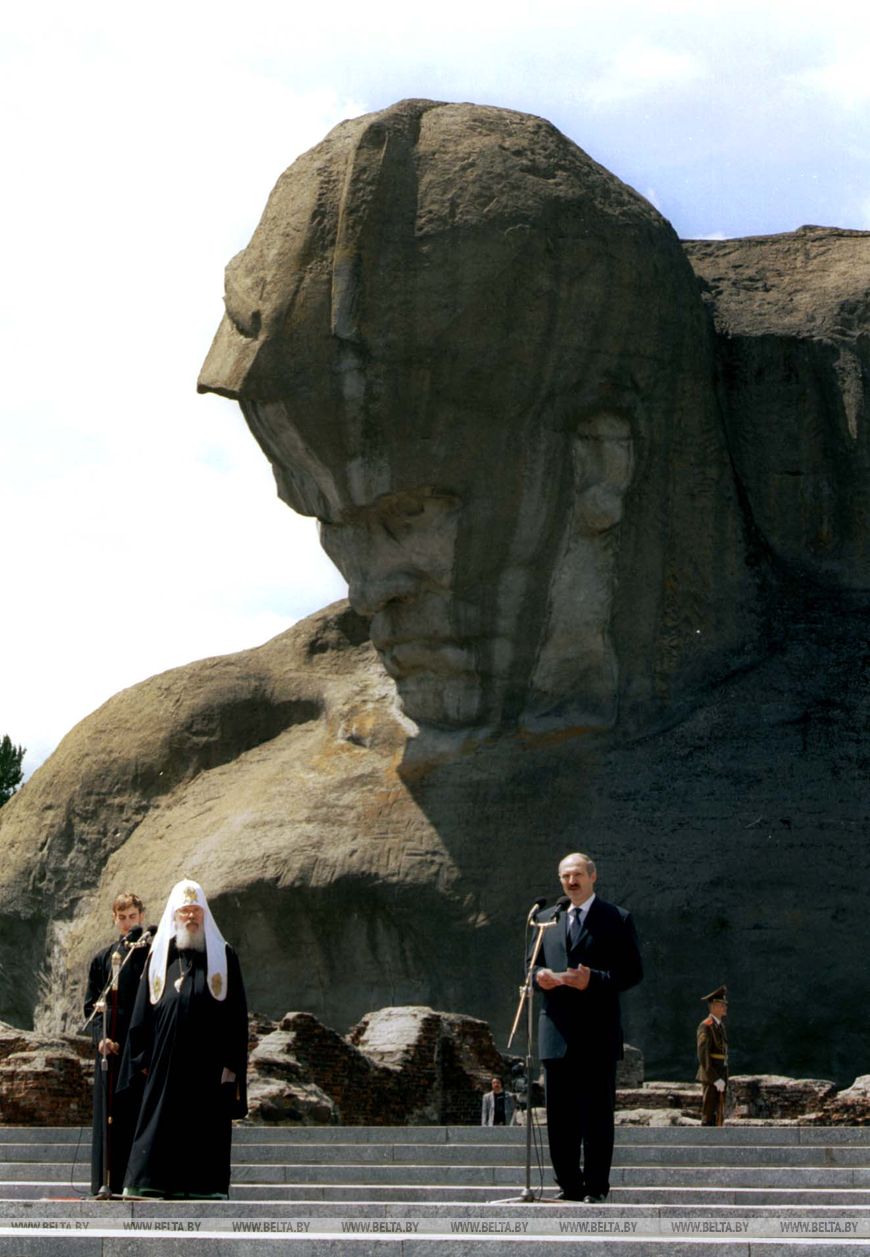
In 2001, music of remembrance and sorrow, of life-affirming strength and hope, echoed across the globe. It was a tribute to the pain of those who lost loved ones, a reminder of how fragile our world and well-being can be. Aleksandr Lukashenko released a statement, emphasizing that the Belarusian people, together with other members of the global community, mourn the victims of terrorism and condemn violence and war.
“On this day, I’d like to assure the people of the Republic of Belarus and the governments of friendly countries that the Belarusian state has done and will continue to do its utmost to join forces with our like-minded partners worldwide to fight the evil of the 21st century that is terrorism and to build a fair, humane, and secure system of international relations,” the Belarusian president stated.
But that is not all that made 2001 a year to remember. To find out more, watch the new episode of the “How it was: DOC” project on BelTA’s YouTube channel.
